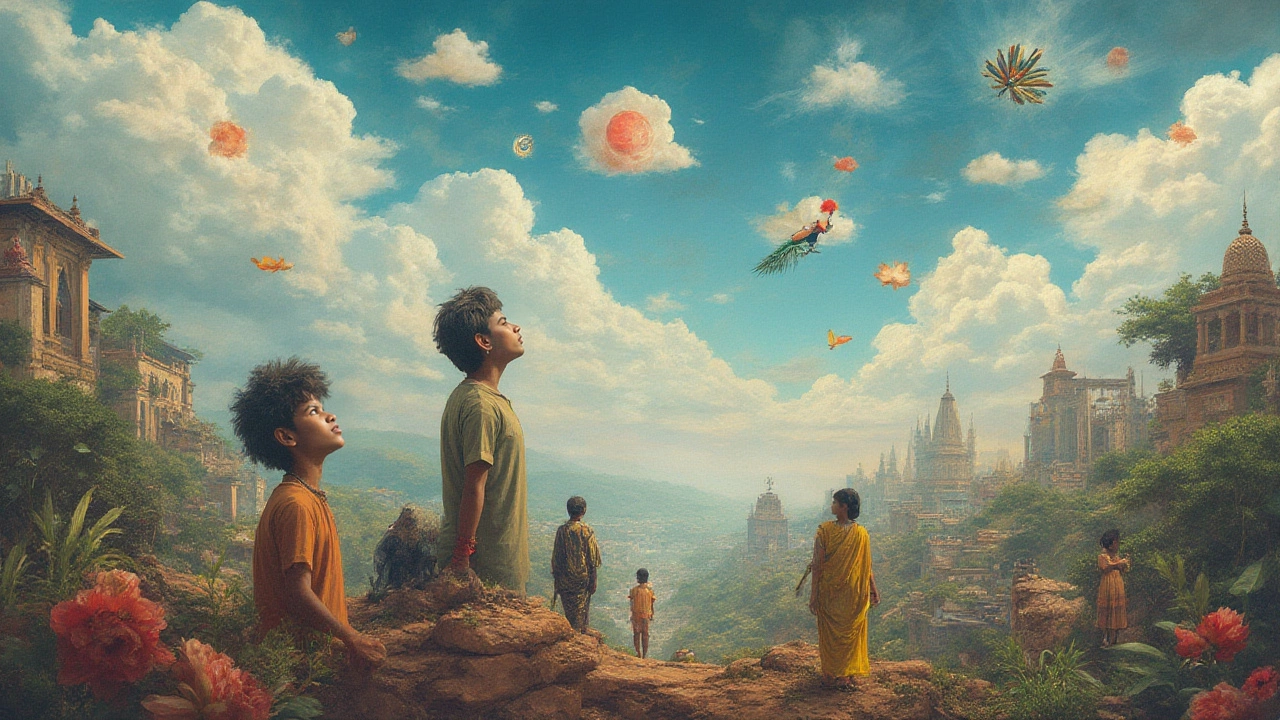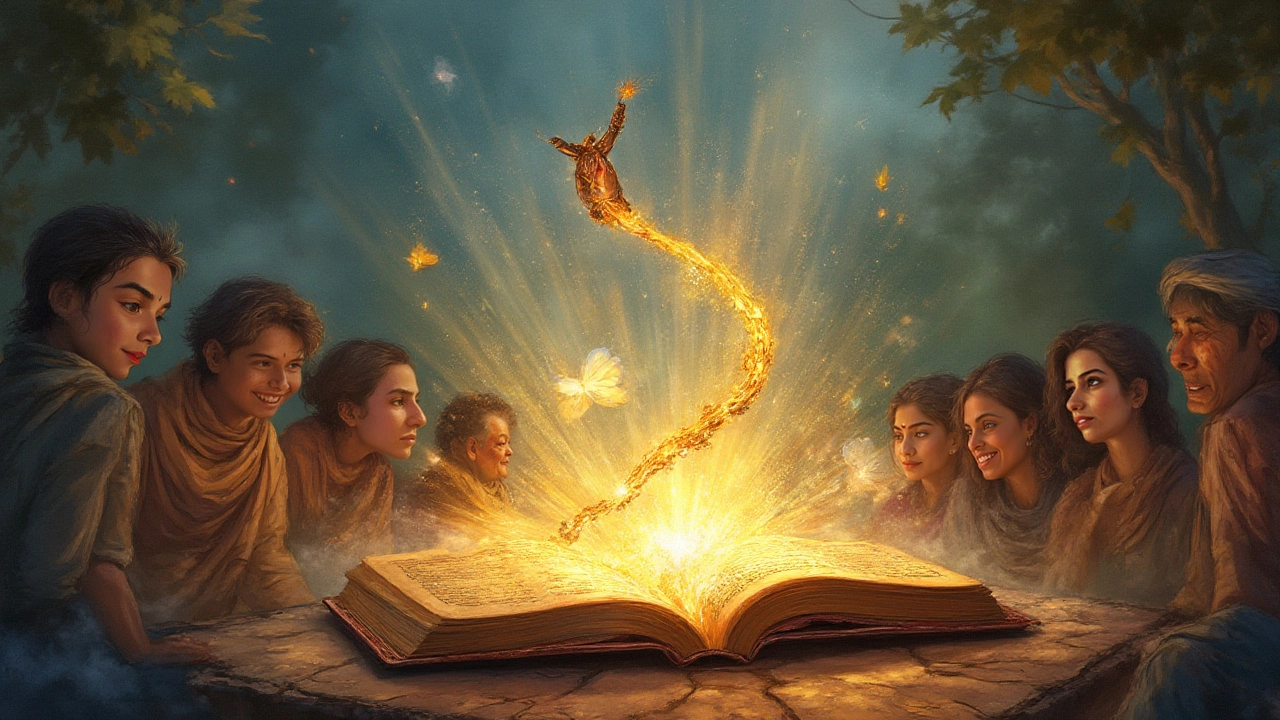Indian Sayings About Dreams: Cultural Wisdom, Meanings, and Modern Relevance
 Jul, 19 2025
Jul, 19 2025
Ever heard your dadi say, “Sapne mein paani dekhna toh bohot shubh hota hai”? Indians have a saying (or sometimes half a dozen) for almost everything, but dreams truly get special treatment. You’ll find someone’s chacha swearing a snake in a dream means money is on its way, while another tells you a wedding in your dream hints at trouble. And then there’s Bollywood, which made dreaming—“sapne dekhna”—look not just poetic but necessary. The funny thing is, India’s relationship with dreams is tangled up in old superstitions, deep philosophy, and even scientific curiosity. If you’ve ever woken up in Delhi, Mumbai, or any of the thousand towns in between, convinced last night’s cinematic dream is a message from somewhere, you’re not alone. But what do these sayings and beliefs really mean? And how do they shape how we see ambition, fate, and that first cup of chai in the morning?
Traditional Indian Sayings and Beliefs About Dreams
When we talk about Indian sayings about dreams, we’re diving into a sea that goes back thousands of years. Hindu texts like the Upanishads and the Atharva Veda took dreams quite seriously—and so did every dadi, nani, and village elder who got her wisdom straight from them.
One of the most quoted sayings is, “Sapne toh mann ka darpan hai”—dreams are the mirror of the mind. The ancient seers believed dreams revealed what’s brewing in your subconscious, not much different from what Freud or Jung said centuries later. But in India, this wasn’t all about the mind; it was also about fate.
In olden days, elders might say, “Jo sapne subah ko dikhe, vo sach hote hain,” meaning if you see a dream just before dawn, it’s most likely to come true. There’s an idea that after a night’s sleep, your mind is closest to its pure self—and any images you see then are important. Many moms still ask what time you dreamt of that gold necklace or scary ghost—and then judge the meaning.
Another gem: “Sapne mein sona dekho, toh dhan aayega”—if you see gold in your dream, it’s a sign of wealth to come. And who hasn’t heard “Sapne mein roshni aaye, toh andhera door hoga”—seeing light in a dream signals an end to troubles? There are dozens of these old proverbs whispered in homes across India. An interesting one connects to animals: if you dream of snakes (“sapne mein saanp dekhna”), it’s not always a bad omen. In some regions, it’s said to mean hidden worries in your life—but in Bengal, seeing snakes is seen as a sign of incoming money.
Here’s a quick snapshot of common dream symbols in Indian sayings:
| Dream Symbol | Common Meaning |
|---|---|
| Water | Peace, purity, new beginnings |
| Snakes | Hidden fears, sometimes money or wisdom |
| Gold | Wealth, luck |
| Marriage | Big life change, sometimes worries ahead |
| Flying | Freedom, ambition, or escape |
| Falling | Insecurity, anxiety |
| Light | Hope, the end of troubles |
Dreams also feature in Indian rituals—if you’re about to get married, you’ll hear, “Don’t ignore your sapne, beta, they can be God’s sign.” Some even fast or do poojas if they see a particularly worrying dream the night before an important event. Now, does everyone buy into these ideas? Not always. But these sayings keep coming up—not just as entertainment, but as comforting, guiding, sometimes even warning voices in daily Indian life.
And it’s not just Hindu tradition—Muslim families in India have their own dream interpretations, with sayings like “Khwab aur sach ka zameen aasman ka farq hai,” roughly meaning reality and dreams are worlds apart. Yet, elders still look for meanings—sometimes consulting the Urdu ‘taabeer-ul-khawab’ books. Sikhs and Christians, too, have sayings and stories about God speaking through dreams. So these dream beliefs aren’t tied to one set of people, but are stitched all across the vast Indian tapestry.

Dreams as Destiny and Ambition in Indian Culture
Beyond their mystical meaning, dreams in India are often linked to the idea of destiny. It’s a bit of a double-edged sword. On one hand, you’ll hear: “Jaisa sapna, waisa kal”—as your dreams, so will be your tomorrow. On the other, elders caution, “Bas sapne mat dekho, mehnat bhi karo”—don’t just dream, work hard too. It’s almost a cultural philosophy: dreaming without action is meaningless, but action without hope—a bit joyless.
Movie fans know how big the idea of dreaming is in India. From “Sapne wahin sach hote hain jo neend mein nahi, aankhon khule hote hain” (Dreams come true when your eyes are wide open, not shut) to “Zindagi badi honi chahiye, lambi nahi,” (‘Life should be big, not just long’), Bollywood has made dreaming big almost a form of rebellion. Ask any teenager in Delhi whose parents want him to stick to engineering, and you’ll probably hear, “But Shah Rukh Khan said sapne dekhne chahiye, na?”
It’s not all about glamour. In rural India, dreams are also about aspiration—of moving to a city, opening a shop, seeing kids do better. You’ll hear stories where someone dreamt of a banyan tree (considered the wish-fulfilling tree in Hinduism) and then got a government job or cracked UPSC. Of course, it’s not scientific, but it feeds hope. The phrase, “Sapne sach karne hain, toh neend se dosti todni padegi”—to make your dreams real, give up your sleep—has motivated generations.
There’s even some research around the Indian obsession with dreams. Psychologist Girishwar Misra found in a study that over half the middle-class respondents in major Indian cities said talking about dreams (sapne) was a part of daily conversation. Another study from Jawaharlal Nehru University noted that Indian youth increasingly see dreaming big as the first step to social mobility—one reason why there’s no shortage of students pulling all-nighters fueled by “sapne.”
You’ll also find old villages where elders still use dream sayings as a guide to decision-making. If someone dreams of a dead relative, there’s a ritual to offer food or visit a temple. If a student dreams of failing an exam, parents soothe them with “Sapne ulte siddh hote hain” (Dreams are often the opposite), using sayings as comfort or sometimes as a pep talk.
So, dreams are more than just sleep stories in India. They’re a way to chase destiny while keeping both feet on the ground—or sometimes, remind you not to ignore warning signs. And those who want actual tips: jot down your dreams. Many believe writing dreams right after waking up can help figure out your goals for the day or understand nagging worries better. Psychologists in Delhi do it too—mixing ancient wisdom with modern mental health tricks.
- If a dream bothers you, tell an elder—the act of “utarna” (sharing) is believed to lighten the burden.
- If you see water or rivers: consider new opportunities are coming. But if the water is dirty, maybe it’s time to clear out some confusion in life.
- Dreaming of flying? Go for that new job or course you’re eyeing—your mind wants freedom.
- If animals crop up often, look up old Indian dream dictionaries. You’ll find some fairly detailed explanations—from cats and elephants to the humble cow.
- Main tip: trust, but don’t overthink. Indians have hundreds of sayings, but being practical never fails either.

Indian Dream Sayings in Modern Times: Myths, Science, and How to Make Sense
You might think dream sayings are old-fashioned, but spend five minutes scrolling WhatsApp forwards or YouTube astrology channels, and you’ll see they’re alive and kicking. Modern life hasn’t erased these ideas—it’s just given them a tech upgrade. Now, apps pop up to “decode” dreams, and you’ll see reels of famous astrologers explaining what seeing a black cat means.
Scientists, of course, have their own takes. At Delhi University, researchers found that Indians living outside India reported more dreams about home—proof our roots show up even when we sleep. Even sleep specialists agree: dreams in India are often more vivid because of the stress modern city life brings, especially with constant change, social expectations, and the race for success. The science doesn’t always match old sayings—but it’s curious how closely they line up sometimes.
The funny part? A 2023 survey by LocalCircles found that 63% of young Indian adults still ask elders about dream meanings after a strange dream. Over half said they look up sayings online. It’s become part of digital culture now—Instagram pages post “dream meaning” lists that get thousands of likes. Some new sayings show up too, like, “Google par sapne ka matlab dhoondhne ka sapna dekhna sabka haq hai”—everyone deserves to dream of Googling dream meanings!
Here’s something useful: dream journaling is on the rise among Indian youth. Apps like Daylio and Dreambook even add a “sapne ka anubhav” section, merging Indian beliefs with global psychology. Therapists suggest writing dreams for self-reflection—not just to decode destiny, but to notice patterns that relate to stress, health, or ambition. Teachers use dream discussions in class to get students talking about personal goals using sayings like “Sapna woh jo aapko sone nahi deta”—a dream that doesn’t let you sleep.
But not everyone is a fan. Some doctors say chasing every dream’s meaning can turn into anxiety. Psychologist Samira Mehta in Delhi says that, while tradition matters, using dream sayings as guides—not rules—is best for mental health. If dream meanings stress you out, trust your gut and talk to someone rather than panic over a midnight vision. No saying replaces actual good sleep, after all.
Want to spot myths versus reality? Here are some quick cues:
- Not every animal or event in your dream is a prophecy. Sometimes, it’s just last night’s daal giving you funny dreams.
- Sapne subah ke sach hote hain (morning dreams come true) is comforting, but there’s no science to guarantee it. Enjoy the story, but don’t let it decide your day.
- Combining new psychology with old Indian wisdom can actually help. If a saying gives hope or helps face worries, use it. Otherwise, let it entertain you.
At the heart of it, Indian sayings about dreams are a glittering mix of caution, encouragement, and cheeky advice. We see dreams as messages, warnings, plots for movies, and sometimes, just pure wishful thinking. They remind us how hope weaves into our culture, shaping everything from the way we handle a bad night’s sleep to how we tackle the world’s chaos over chai in the morning.
So, next time someone tells you, “Sapne sapne hote hain, bhool jao,” or the opposite, “Sapne hai toh zinda ho tum,” pay attention. Our dreams—those literally and metaphorically—are part of what makes India such an eternally hopeful, complicated, and lively place to wake up in.